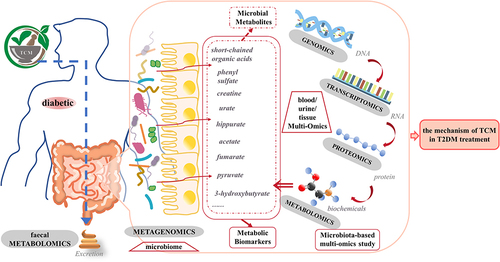Figures & data
Table 1 Biomarker Discovery in T2DM
Table 2 Treatments for T2DM Evaluated by Metabolomics Approaches
Table 3 Biomarker Discovery in Diabetic Retinopathy
Table 4 Biomarker Discovery in Diabetic Nephropathy
Table 5 Biomarker Discovery in Peripheral Neuropathy
Figure 1 Application of Multi-Omics and microbiome Integration in TCM Treating T2DM. The human microbiome plays a role in the etiology and pathology of T2DM and its complications. Metabolites originating from microorganisms are potentially important compounds that mediate microbiota-host interactions in health and disease. External factors such as TCM and internal factors such as the host genome can influence microbial diversity. Changes in the microbiome later affect the metabolites that they produce. Metagenomics is suitable for determining intestinal microbiota composition, while metabolomics can find functional endpoints. Genomics obtained candidate genes related to transcriptomics, while transcriptomics obtained functional gene clusters related to disease pathogenesis. Proteomics can analyze expressed proteins and protein function in a cellular context. It will be vital to reveal the role of the microbiome in T2DM and the mechanism of traditional Chinese medicine in T2DM treatment by integrating metagenomic data and data generated by host omics in the future.

